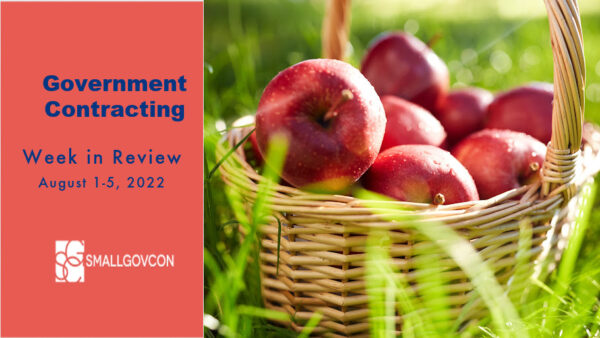In our line of work, we regularly litigate protests, claims, appeals, etc., against the Government. But often, procuring and contracting issues can be resolved without the need for litigation–via a little-known method we like to call “talking things out with your CO.” There are also some important things to keep in mind regarding contract performance communications. This article is the last of three articles aimed at providing helpful tips for communicating with your contracting officer. Part 1, which focused on pre-solicitation and solicitation communications, can be found here. And Part 2, which focused on proposal submission communications, can be found here. This article will focus on contract performance communications.
Continue readingAuthor Archives: Nicole Pottroff
Who You Gonna Call? Your Contracting Officer (Part 2)
In our line of work, we regularly litigate protests, claims, appeals, etc., against the Government. But often, procuring and contracting issues can be resolved without the need for litigation–via a little-known method we like to call “talking things out with your CO.” There are also some important things to keep in mind regarding communications with your contracting officer during the proposal submission process. This article is the second of three articles aimed at providing helpful tips for communicating with your contracting officer. Part 1, which focused on pre-solicitation and solicitation communications, can be found here. This article will focus on proposal submission communications. And the third will focus on contract performance communications.
Continue readingKoprince McCall Pottroff LLC Names John Holtz New Senior Associate Attorney!
Koprince McCall Pottroff LLC, a boutique federal government contracts firm in Lawrence, Kansas, is pleased to announce that John Holtz has been promoted to the role of Senior Associate Attorney.

Since his time with the firm began, John has excelled at providing the highest quality service and counsel as a federal government contracting attorney. “I am both deeply appreciative and excited to work with this firm in an elevated capacity. I look forward to this new role and providing even greater services for our clients,” John says.
John has been practicing since 2016, and his previous experience lent itself well to working in federal contracting legal matters. With Koprince McCall Pottroff LLC, John has been part of numerous successful bid protests, size appeals, and government contract disputes. He is passionate about getting clients the best results and always goes above and beyond for each one–be it for a minor drafting question or a Court of Federal Claims case. John has also been a regular contributor to the firm’s well-known blog, SmallGovCon.com, and has participated in numerous webinars and presentations sharing his knowledge and passion with others. Koprince McCall Pottroff LLC is excited to announce this news and to see all that the future holds for John in his new role.
John Holtz can be reached at: jholtz@koprince.com
Who You Gonna Call? Your Contracting Officer
In our line of work, we regularly litigate protests, appeals, claims, etc., against the Government. But often, procuring and contracting issues can be resolved without the need for litigation–via a little-known method we like to call “talking things out with your CO.” There are also opportunities to communicate with your contracting officers for networking and marketing purposes that many contractors (often unnecessarily) shy away from. This article is the first of three articles that will provide you with some tips for when and how to communicate with your contracting officer at different steps of the procurement process. This article will focus on pre-solicitation and solicitation communications; the next will focus on proposal submission communications; and the third will focus on contract performance communications.
Continue readingBack to Basics: Types of Affiliation
This is a the second article of two taking you back to the basics of affiliation. The first, giving you a general overview of affiliation, can be found here. This follow-on article goes through the different bases for affiliation, as set forth in SBA’s affiliation regulations. Keep in mind though, this is still affiliation “basics” and does not go into a detailed analysis of each type of affiliation, as that would be a novel–not a blog.
Continue readingSmallGovCon Week in Review: August 1-5, 2022

Happy Friday, Readers. We hope you had a great week. Shane McCall, our usual Week in Review contributor, is enjoying a much deserved vacation with this family and I have the delightful privilege of filling in for him. Can you believe it’s August already and school will soon be starting? The Summer is flying right by!
Continue readingBack to Basics: Affiliation, An Overview
Affiliation is quite possibly one of the scariest words to small business government contractors. And it is easily one of the most misunderstood concepts in SBA’s small business regulations. Perhaps the widespread fear and misunderstanding are due to the fact that there are so many potential bases for affiliation listed in SBA’s rules–or the fact that you can be found affiliated with another company even if SBA finds that none of the listed bases for affiliation are met. Or maybe its the fact that, while affiliation isn’t always a bad thing, it can lead to severe consequences, like preventing an otherwise responsible and eligible business from competing under set-asides contracts.
Either way, this “Back to Basics” blog will be the first of two blogs that will “unpack” this concept for you, hopefully, removing some of the mystery. This first blog will provide a general overview of affiliation and what it means for government contractors, while the second blog will focus on the different types of affiliation.
Continue reading